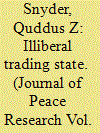| Srl | Item |
| 1 |
ID:
121788


|
|
|
|
|
| Publication |
2013.
|
| Summary/Abstract |
Liberal systemic theory is built on the assumption that the system's dominant configuration is a Kantian confederation of major powers. In addition to being a democratic cluster, the liberal core is also a capitalist club. This article pushes systemic and socialization theory forward by introducing the mechanism of economic competition as an important driver of socialization. The article develops a theory of system-level competition, arguing that it is a distinct and co-equal mechanism of socialization to the established mechanisms of persuasion, inducement, and coercion. The article proposes a three-staged model of socialization that explains how prominent rising powers such as Turkey, India, Brazil, and China are being socialized into the liberal system. At the first phase, competitive pressure, outsiders are led to orient themselves toward the core out of a fear of falling behind and a desire to access network benefits. At the second phase, rushing, outsiders behave in pro-norm ways and make significant concessions in order to gain inclusion in the core's institutional complex. At the third phase, internalization, external norms become embedded in domestic legal institutional structures and a robust pro-norm domestic coalition emerges. The article uses the case of China to illustrate the model and lend it some initial empirical support in one hard case.
|
|
|
|
|
|
|
|
|
|
|
|
|
|
|
|
| 2 |
ID:
118960


|
|
|
|
|
| Publication |
2013.
|
| Summary/Abstract |
Why have non-Western powers, such as China, pursued a grand strategy of commercial integration into the liberal system? In developing a general theory of competitive pressure, this article builds upon a growing body of literature that seeks to develop a liberal systemic theory. Powerful network externalities - system-level pressures and incentives - have emerged as a by-product of the highly integrated liberal core. Outsiders have been moved by an interest in accessing these network benefits as well as a fear of falling behind in the struggle for relative power. In a plausibility probe, the article explores China's decision to join the world.
|
|
|
|
|
|
|
|
|
|
|
|
|
|
|
|
| 3 |
ID:
126721


|
|
|
|
|
| Publication |
2013.
|
| Summary/Abstract |
Liberals have discovered the system level of analysis. Two somewhat competing strands of system-level liberal scholarship have emerged. The first emphasizes the system's normative dynamics and the democratic peace. The second has sought to conceive of capitalism as a property of the international system and theorize its effects. While a number of propositions and mechanisms have been identified, the literature has failed to develop an overarching account of system structure. Using Durkheim's distinction between mechanical and organic societies, and Waltz's tripartite definition of structure, this paper develops a liberal grand-theory that integrates these two strands of liberal systemic thinking. The theory generates a number of large propositions: the structure's dominant tendency is integration; it pushes states to specialize; and it induces a competitive normal politics. I also propose a typology of systems that vary according to liberal homogeneity and a liberal normative framework and mutual economic dependence, with important implications for the question of systemic stability. By way of conclusion, I offer a few thoughts on the value of grand-theorizing in International Relations.
|
|
|
|
|
|
|
|
|
|
|
|
|
|
|
|